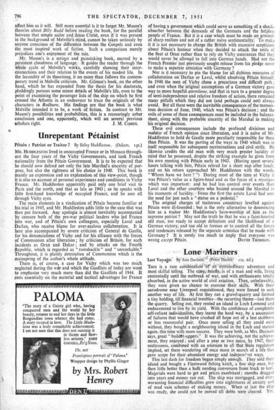Unrepentant Petainist
Petain : Patriot or Traitor ? By Sisley Huddleston. (Dakers. us.)
Mn. HUDDLESTON lived in unoccupied France or in Monaco through- put the four years of the Vichy Governments, and took French nationality from the Petain Government. It is to be expected that he should now defend not only the late Marshal's sincerity of pur- pose, but also the rightness of his choice in 1940. This book is mainly an expression and an explanation of this view-point, though It is also an account of personal experiences and conditions in Vichy France. Mr. Huddleston apparently paid only one brief visit to Paris and the north, and that as late as 1943; so he speaks with little first-hand knowledge of occupied France, and he sees all through Vichy eyes.
The main elements in a vindication of Petain became familiar at his trial in 1945, and Mr. Huddleston adds little to the case that was then put forward. Any apologia is almost inevitably accompanied by censure both of the pre-war political leaders who led France Into war, and of Pitain's own colleagues, especially Laval and Darien, who receive blame for over-zealous collaboration. It is here also accompanied by severe criticism of General de Gaulle, for his denunciations of Vichy and for his affiance with the forces of Communism after liberation ; by criticism of Britain, for such incidents as Oran and Dakar ; and by attacks on the Fourth Republic, which is regarded as " ramshackle " and "unworkable." Throughout, it is plainly detestation of Communism which is the mainspring of the author's whole attitude.
There is, of course, a case for Vichy which was too much neglected during the wAr• and which the Gaullists of today are wont to emphasise very much more than did the Gaullists of 1944. It rests essentially on the material and tactical advantages for France of having a government which could serve as something of a shock- absorber between the demands of the Germans and the helpless people of France. But it is a caSe which must be made on grounds of sharp realism and not of a rather naive sentimentality: To make it it is not necessary to charge the British with excessive scepticism about Petain's honour when they decided to attack the units of the fleet at Oran rather than to rely -on Vichy -as.suranCes that they would never be allowed to fall into German hands. Had not the French Premier -just previously sought release from his pledge never to make a separate armistice with Germany ? Nor is it necessary to pin the blame for all dubious measures of collaboration on-Darlan or Laval, whilst absolving Petain himself. In 1940. the men of Vichy chose a precarious and difficult path ; and evenwhen the original assumptions of a German victory gave way to more hopeful, attentisme, and that in turn to a greater degree of semi-independence and relative freedom of action,- there remained many pitfalls which they did not (and perhaps could ncit) always avoid. But all these were the inevitable consequences of the-tnomen- tons decision of June, 1940, which was Petain's decision ; and the evils of some of these consequences must be included in the balance- sheet, along with the probable sincerity of the Marshal in making his original decision. - These evil consequences include the profound divisions and malaise of French opinion since liberation, and it is naive of Mr. Huddleston to hold de Gaulle more peculiarly-responsible for these than Petain. It was the parting of the ways in 1940 which was in itself responsible for subsequent recriminations and civil strife. He likewise credits the old man with very much greater lucidity of mind that he possessed, despite the striking example he gives from his own meeting with Petain early in 1943. (Having spent several hours talking with him, Petain retired for a short nap after lunch, and on his return approached Mr. Huddleston with the words, "Whom have we here ? ") During most of the time at Vichy it was Petain's value as a figure-head and as the focus of a mystique which was important: and he had less control over events than Laval and the other courtiers who buzzed around the Marshal in his moments of lucidity.-'From the first-the astute Laval had seen the need for just such a "statue on a pedestal."
The original charges of traitorous conspiracy levelled against Main were ill-founded ; but is the only alternative to denouncing him as a traitor Mr. Huddleston's hero-worship of -him as the supreme patriot ? May not the truth be that he was a faint-hearted old man, too ready to accept defeatism and the likelihood of a German victory, and toot old to foresee or to control all the forces and tendencies released by the separate armistice that he made with Germany ? It is surely too much to imply that everyone was


















































 Previous page
Previous page